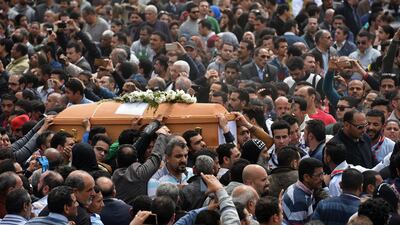This year there will be muted Easter celebrations for Coptic Christians in Egypt. Out of concern for their security and out of respect for the 45 Christians who were victims of two suicide bombing attacks on Palm Sunday, Coptic Pope Tadros declared that Easter services should be limited to mass, “without any festivities”.
That holy week began for Egyptians with news of those bombings was a powerful reminder of the threats faced by Christian communities in the Arab world. In Egypt, Iraq, Syria, and Palestine, Christian communities are at risk.
The situation in Palestine is unique. There, Christians and Muslims alike are being strangled by the Israeli occupation. Only with great difficulty will Christians from Bethlehem, Bir Zeit or Ramallah be able to make pilgrimage to Jerusalem to walk the Stations of the Cross or to pray at the Church of the Sepulchre. Many Palestinians can see Jerusalem from their homes, but they are separated from the city by a wall and checkpoints.
The situation faced by Christians in Iraq and Syria is quite a different story.
In Iraq, the remnants of that country’s once thriving Christian church live in fear. Americans who only recently discovered Iraq’s ancient churches do not realise that before the Bush administration’s disastrous 2003 invasion there were 1.3 million Christians in Iraq. Despite assuming some religious trappings, Saddam Hussein’s ruthless dictatorship was secular and, therefore, provided Christians some degree of religious freedom.
One result of the US invasion that overthrew Saddam’s regime and dismantled Iraq’s state apparatus was to unleash a civil war of armed sectarian militias, a feature of which was the “ethnic cleansing” of entire neighbourhoods of Sunni and Shia Muslims and, of course, vulnerable Christians – who had no militias to protect them.
During the first five years of the Iraq war, the Christian population of Iraq declined from 1.3m to 400,000. But it wasn’t until the emergence of bloody ISIL that the West paid attention to the fate of Iraq’s Christians. ISIL may soon be defeated and Christians and other minorities may receive protection in Nineveh province, but fear remains.
The Syrian situation is a variation on this theme. The no less brutal Assad regime is also secular and has provided protection for that country’s Christian communities, earning it the support of many Christian leaders, who have a greater fear of both ISIL and many of the militias who have an extremist sectarian bent. Most Christians have remained in regime-controlled areas, but they are caught between two evils.
Egypt’s Coptic Church is the largest in the Middle East – with between 8 and 10 million adherents. Despite its size, it is vulnerable to attacks. During the period of Muslim Brotherhood rule, Christians felt threatened by what they saw as an effort to politicise religion and Islamise the state. In 2013, the military ousted the elected Muslim Brotherhood government resulting in bloody confrontations. In response, violent extremist partisans of the deposed leadership took out their anger on the Christian community. During this time, churches were burnt and Christians were murdered and terrorised.
Since then, the government of Abdel Fattah El Sisi and Ahmed El Tayeb, Grand Imam of Al Azhar, have made significant gestures of support for Egypt’s Christians. Both have condemned the attacks and intolerance. They have called for and implemented a review of educational and other religious materials. The president has gone to Christmas mass for the past three years, and in two weeks the head of Al Azhar will host a historic meeting in Egypt with Pope Francis, as part of a conference on interfaith dialogue.
All of these constructive efforts, however, are in danger of being undercut by the government’s crackdown on the Egyptian media and a number of human rights organisations and other secular political groupings. Thousands have been imprisoned.
Instead of making Christians more secure, the arrests and pervasive climate of fear created by the repression have undercut efforts to promote tolerance and stability, with Christians being the “soft targets” for religious extremists.
The lesson should be clear. Repression may produce some short-term satisfaction, but it doesn’t create the long-term conditions that promote the security and tolerance needed to protect vulnerable minority communities. Christians in Iraq and Syria may have benefited, for a time, from brutally imposed secularity, but the resentment that resulted from prolonged oppression unleashed a deadly extremist wave drowning everything in its wake.
The official US reaction to the still unfolding tragedies facing the Christians of the Arab world is utterly frustrating. The US never understood or even considered what would happen to Iraq when it foolishly invaded that country. And the US still has no clue about the internal dynamics that shape the Syrian horror. At the same time, because successive administrations cannot even see Palestinian humanity, the US maintains a disgraceful silence in the face of Israel’s strangling of the Palestinian people, both Christians and Muslims. And in Egypt the US fails to caution the government regarding the potential consequences of their disregard for human rights.
The result is a record of disaster with the best evidence of this failure being the growing dangers faced by the region’s vulnerable Christian communities.
Dr James Zogby is president of the Arab American Institute
On Twitter: @aaiusa


